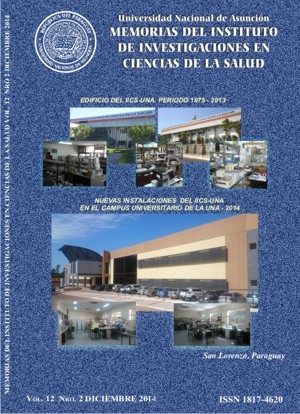Frecuencia de Hipertensión Arterial en pacientes de primera consulta en consultorio externo de la Primera Cátedra de Clínica Médica, Hospital de Clínicas, año 2012
Keywords:
frecuencia, hipertensión arterial, factores de riesgo cardiovascular, consultorioAbstract
La hipertensión arterial es un factor de riesgo para el desarrollo de enfermedades cardiovasculares, principales causas de mortalidad en todo el mundo. El objetivo de este trabajo fue determinar la frecuencia de hipertensión arterial y su asociación con otros factores de riesgo cardiovascular en pacientes de primera consulta en el consultorio de la Primera Cátedra de Clínica Médica del Hospital de Clínicas, FCM, UNA en 2012. Se realizó un estudio observacional, descriptivo, retrospectivo, con componente analítico en el que se estudió a pacientes entre 18 y 90 años, seleccionados por muestreo aleatorio simple. En el periodo de estudio se registraron 4.046 historias clínicas en primera consulta, y 3.854 fueron consideradas para la aleatorización. Se estudiaron las variables demográficas, antropométricas, bioquímicas, presencia de hipertensión arterial, diabetes mellitus tipo 2, consumo de alcohol y tabaco. Se analizaron las historias clínicas de 457 pacientes con una edad media de 44,13±17 años; 48,23±18 años en hombres y 46,61±11 años en mujeres, 300 (66%) fueron mujeres. La frecuencia de la hipertensión arterial ± IC95% fue de 30,41±4,2%, sin diferencia significativa entre mujeres y hombres (32,33±4,3% versus 28±4,1%). La obesidad fue el factor de riesgo cardiovascular más frecuente. Alrededor del 60% de los pacientes presentaba uno o más factores de riesgo cardiovascular. La hipertensión arterial se asoció con la obesidad (OR: 4,427; IC95%: 2,345-4,876; p=0,032), la diabetes (OR: 2,141; IC 95%: 1,261-2,347; p=0,005) y niveles de c-HDL <35 mg/dl (OR: 1,761; IC 95%: 1,116-1,876; p= 0,001). Las altas frecuencias de hipertensión arterial y obesidad observadas en esta población coinciden con los datos reportados a nivel nacional y estuvo asociada significativamente a otros factores cardiovasculares.
Downloads
References
Mahmood SS, Levy D, Vasan RS, Wang TJ. The Framingham heart study and the epidemiology of cardiovascular disease: a historical perspective. Lancet. 2014; 383(9921): 999-1008.
WHO. Global health risks: mortality and burden of disease attributable to selected major risks. Geneva: WHO; 2009.
Bozorgmanesh M, Hadaegh F, Sheikholeslami F, Ghanbarian A, Azizi F. Shadow of diabetes over cardiovascular disease: comparative quantification of population-attributable all-cause and cardiovascular mortality. Cardiovasc Diabetol. 2012; 11:69.
Lewington S, Clarke R, Qizilbash N, Peto R, Collins R. Age-specific relevance of usual blood pressure to vascular mortality: a meta-analysis of individual data for one million adults in 61 prospective studies. Lancet. 2002; 360(9349):1903-13.
Stauffer ME, Weisenfluh L, Morrison A. Association between triglycerides and cardiovascular events in primary populations: a meta-regression analysis and synthesis of evidence. Vasc Health Risk Manag. 2013; 9:671-80.
Martin SS, Blaha MJ, Blankstein R, Agatston AS, Rivera JJ, Virani SS, et al. Dyslipidemia, coronary artery calcium, and incident atherosclerotic cardiovascular disease: Implications for statin therapy from the multi-ethnic study of atherosclerosis. Circulation [Internet]. 2014. [consultado 8 de marzo de 2014]; 129: 77-86. Disponible en:
Athyros VG, Katsiki N, Doumas M, Karagiannis A, Mikhailidis DP. Effect of tobacco smoking and smoking cessation on plasma lipoproteins and associated major cardiovascular risk factors: a narrative review. Curr Med Res Opin. 2013; 29:1263-74.
Owen N, Sparling PB, Healy GN, Dunstan DW, Matthews CE. Sedentary behavior: emerging evidence for a new health risk. Mayo Clin Proc. 2010; 85(12):1138-41.
Joffres M, Falaschetti E, Gillespie C, Robitaille C, Loustalot F, Poulter N, et al. Hypertension prevalence, awareness, treatment and control in national surveys from England, the USA and Canada, and correlation with stroke and ischaemic heart disease mortality: a cross-sectional study. BMJ Open [Internet]. 2013 [consultado 2013 oct. 8]; 3: e003423. Disponible en: http://bmjopen.bmj.com/content/3/8/e003423.full.pdf+html
Cicero AF, Salvi P, D'Addato S, Rosticci M, Borghi C. Association between serum uric acid, hypertension, vascular stiffness and subclinical atherosclerosis: data from the Brisighella Heart Study. J Hypertens. 2014; 32(1):57-64.
Morillas P, de Andrade H, Castillo J, Quiles J, Bertomeu-González V, Cordero A, et al. Inflammation and apoptosis in hypertension. Relevance of the extent of target organ damage. Rev Esp Cardiol (Engl Ed). 2012; 65(9):819-25.
Kaur P, Radhakrishnan E, Sankarasubbaiyan S, Rao SR, Kondalsamy-Chennakesavan S, Rao TV, Gupte MD. A comparison of anthropometric indices for predicting hypertension and type 2 diabetes in a male industrial population of Chennai, South India. Ethn Dis. 2008; 18(1):31-6.
Knight JA. Physical inactivity: associated diseases and disorders. Ann Clin Lab Sci. 2012; 42(3):320-37.
Sobrino J, Domenech M, Camafort M, Vinyoles E, Coca A. Prevalence of masked hypertension and associated factors in normotensive healthcare workers. Blood Press Monit. 2013; 18(6):326-31.
Satman I, Omer B, Tutuncu Y, Kalaca S, Gedik S, Dinccag N, et al. Twelve-year trends in the prevalence and risk factors of diabetes and prediabetes in Turkish adults. Eur J Epidemiol. 2013; 28:169-80.
Zhang YR, Ge PF, Liao YJ, Guo LL, Zhang CJ, Dong CX, et al. The tendency of prevalence of hypertension in two countries in Gansu province from 1990 to 2012. Zhonghua Yu Fang Yi Xue Za Zhi. 2013; 47:306-11.
Oliveira BF, Mourão Dde S, Gomes N, Costa JM, Souza AV, Bastos WR, et al. Prevalence of arterial hypertension in communities along the Madeira River, Western Brazilian Amazon. Cad Saude Publica. 2013; 29:1617-30
Ogah OS, Okpechi I, Chukwuonye II, Akinyemi JO, Onwubere BJ, Falase AO, et al. Blood pressure, prevalence of hypertension and hypertension related complications in Nigerian Africans: A review. World J Cardiol. 2012; 4:327-40.
Devi P, Rao M, Sigamani A, Faruqui A, Jose M, Gupta R, et al. Prevalence, risk factors and awareness of hypertension in India: a systematic review. J Hum Hypertens. 2013; 27:281-7.
Nwankwo T, Yoon SS, Burt V, Gu Q. Hypertension among adults in the United States: national health and nutrition examination survey, 2011-2012. NCHS Data Brief. 2013; (133):1-8.
Sánchez RA, Ayala M, Baglivo H, Velázquez C, Burlando G, Kohlmann O, et al. Guías latinoamericanas de hipertensión arterial. Rev Chil Cardiol. 2010; 29: 117-44.
Ortiz Marrón H, Vaamonde Martín RJ, Zorrilla Torrás B, Arrieta Blanco F, Casado López M, Medrano Albero MJ. Prevalence, degree of control and treatment of hypertension in the adult population of Madrid, Spain. Rev Esp Salud Publica. 2011; 85:329-38.
Cañete F. Primera encuesta nacional de factores de riesgo y enfermedades no transmisibles realizado en el Paraguay en el año 2011 [Internet]. Asunción: MSP y BS. Dirección Vigilancia de Enfermedades No Transmisibles; 2011 [consultado 10 de oct 2013] Disponible en: http://www.nutrisys-py.com/descarga/img/-ENT.pdf
Browner WS, Newman TB, Hulley SB. Apendice 6E: tamaño de la muestra para un estudio descriptivo de una variable dicotómica. In: Hulley SB, Cummings SR, Browner WS, Grady DG, Newman TB. Diseño de investigaciones clínicas. 3a ed. Barcelona: Wolters Kluwer; Lippincott Williams & Wilkins; 2008. p. 102.
Chobanian AV, Bakris GL, Black HR, Cushman WC, Green LA, Izzo JL Jr, et al. The Seventh Report of the Joint National Committee on Prevention, Detection, Evaluation and Treatment of High Blood Pressure: the JNC 7 report. JAMA. 2003;289(19):2560-72.
Barba EJR. Lípidos, aterogénesis y riesgo coronario. Rev Mex Patol Clin. 2005; 52(3): 176-89.
Expert Panel on Detection, Evaluation, and Treatment of High Blood Cholesterol in Adults. Executive summary of the third report of the National Cholesterol Education Program (NCEP) expert panel on detection, evaluation, and treatment of high blood cholesterol in adults (Adult treatment panel III). JAMA 2001; 285(19): 2486-97.
WHO, Expert Committee. Physical status: the use and interpretation of anthropometry: Report of a WHO Expert Committee. Geneva: WHO; 1995. WHO Technical Report Series, 854.
Expert. Committee on the Diagnosis and Classification of Diabetes Mellitus. Report of the expert committee on the diagnosis and classification of diabetes mellitus. Diabetes Care. 2003; 26(Suppl 1):S5-20.
Ferreira SRG, Moura EC, Malta DC, Sarno F. Freqüência de hipertensão arterial e fatores associados: Brasil, 2006. Rev. Saúde Pública. 2009; 43: 98-106.
Hernández Gárciga FF, Opeyemi Jimada I, Pría Barros MC. Riesgo cardiovascular global consultorio 3: Área de salud de Guanabo 2008. Rev haban cienc méd. 2010; 9[suppl 5]: 641-9.
Yannoutsos A, Levy BI, Safar ME, Slama G, Blacher J. Pathophysiology of hypertension: interactions between macro and microvascular alterations through endothelial dysfunction. J Hypertens [Internet]. 2014 [consultado 24 de marzo 2014]; 32(2):216-24. Disponible en: http://www.ncbi.nlm.nih.gov/pubmed/24270179.
Jackson ChF, Wenger NK. Enfermedad cardiovascular en el anciano. Rev Esp Cardiol. 2011; 64(8): 697–712.
Fasce H, Fasce F, Zarate H, Campos I, Flores M, Ibáñez P. Relación entre perímetro abdominal, nivel socioeconómico y presión arterial. Rev Chil Cardiol. 2010; 29(1): 11-8.
Cuspidi C, Rescaldani M, Sala C, Negri F, Grassi G, Mancia G. Prevalence of electrocardiographic left ventricular hypertrophy in human hypertension: an updated review. J Hypertens. 2012;















